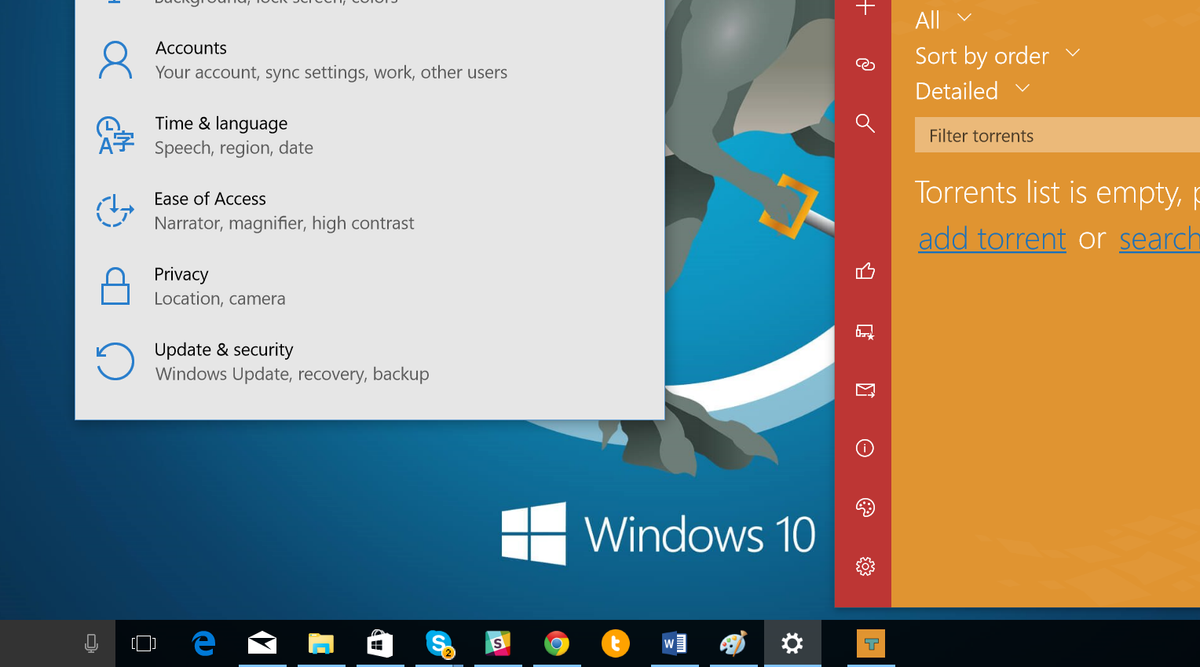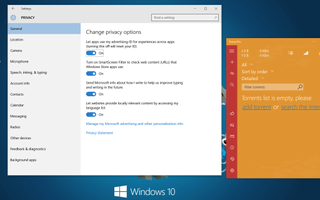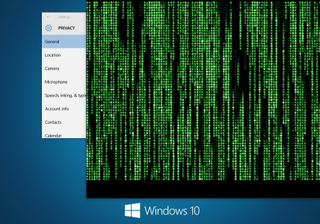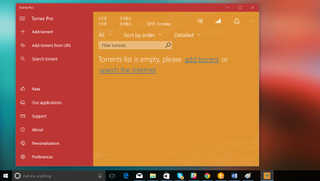Here is why torrent trackers banning Windows 10 is naïve and premature
Evidently some low-level torrent trackers are banning Windows 10 due to paranoia over the new OS.

When it comes to the world of bittorrent, you cannot sidestep the big red flag that the majority of its usage is for sharing copyrighted material. Sure, torrents have legitimate uses, but let's not kid ourselves that most users are trading music, movies, games, and comics.
Putting that background into context and it is understandable that people running private trackers like iTS are slightly paranoid. After all, their business can be one fraught with lawsuits and criminal penalties.
Who is banning what?
If you have never heard of iTS and some of the other sites reported on Torrent Freak this Saturday as 'banning Windows 10', don't worry as these are the small fish in the torrent world. Unlike the legendary Pirate Bay or Demonoid, iTS and others are relatively unknown and, therefore, their actions less interesting.
According to the site Torrent Freak, who reports on the bittorrent scene, iTS has already banned Windows 10 users from using their service and BB and FSC are considering the same. The reason? Their misinterpretation of Microsoft's EULA for Windows 10 and the Windows Store.

Indeed, Windows Central initially fell for the legalese trap when we reported that Microsoft could "revoke" or disable pirated games. Of course, anyone who has used Windows Phone in the past knows that Microsoft has had this ability for a very long time. Indeed, we once watched it work with a pirated GPS app found in the Store. A user bought, downloaded, and re-uploaded the software to the Store and offered it for free. Microsoft not only banned the user but then pulled the pirated software off of people's devices.
Windows Phone Marketplace works...pirated software promptly removed (2011)
This ability to be able to revoke software offered through the Store is very important for piracy and security concerns. Were Microsoft to find software that illegally recorded phone calls it would be necessary to pull that software not just from the Store but from unsuspecting users too.
Get the Windows Central Newsletter
All the latest news, reviews, and guides for Windows and Xbox diehards.
Put it this way: For years, Microsoft did not have a centralized store for distributing protected software. What is the legacy of Windows? Browser helper objects, pirated software, viruses, and yes, whoops, security risks for the common people. Ironic that in addressing security and safety in Windows 10 Microsoft is being accused of draconian privacy violations.
Folks, someone, has to watch the software. If not you, then good luck to grandma downloading that .exe from whatever site she received in that phishing email. Likewise, best of wishes if you want to hack Xbox Live or use OneDrive to distribute pirated software (or worse).
In short, Microsoft does not like the idea of you using their services to facilitate a possible copyright crime or aid in distributing illegal pornography. Do it if you want to, just don't ask Microsoft to help you by letting you use their technology. Some users may see this as intrusive, but Microsoft has a business to run and a reputation to uphold.
Their reasons are…crazy?
Complaints from iTS and BB range from the ludicrous:
"Amongst other things Windows 10 sends the contents of your local disks directly to one of their servers. Obviously this goes way too far and is a serious threat to sites like ours which is why we had to take measures"
...to the insane.
"What's particularly nasty is that apparently it sends the results of local(!!) searches to a well known anti-piracy company directly so as soon as you have one known p2p or scene release on your local disk … BAM!"
The company in question is MarkMonitor, whom, as Torrent Freak rightly points out, Microsoft has been working with for years. Even more, MarkMonitor is also used for anti-phishing schemes, and spam passed through Internet Explorer, Microsoft Edge, and Outlook. If you ever wondered what powers Microsoft's SmartScreen technology (which you can disable), well there you go.

As far as sending the contents of your local disks directly to their servers, well yeah, welcome to the world of OneDrive, which syncs your folders to the cloud with your permission. Granted, you can disable OneDrive, or only share particular folders, but such nuance is lost of the geniuses at iTS.
I want academics, researchers, and experts tell me I should fear Windows 10, not some kid running a two-bit torrent site.
All you need to know about privacy and settings in Windows 10 and Microsoft Edge
Paranoia is good, but facts are better
The problem I have with all of this privacy paranoia is we have yet to see any conclusive information about what "bad things" Microsoft is doing with it. Particularly I mean there have been no prominent hackers or academics yet who have done an adequate analysis or written any white papers on major security concerns.
Those critical analyses may be coming, but until then it is hard to get too worked up about it. Alternatively, if you are that concerned with security, privacy, and air-gapped PCs, well what are even doing using Windows? To my knowledge, no 31337 h4x0r fires up Cortana before coding their latest exploit. But hey, there are a lot of script kiddies out there, what do I know.
None of this is to say Microsoft is a do-goody company or that you should completely trust them.Certainly not. However, until those with expertise weigh in the matter, I simply won't take the what-if legal and technical advice from bloggers or those without reputations in the field. If you are getting security advice from anonymous staffers on a torrent site or YouTube, well, I think you could do better.

Microsoft's EULA is not much different from what was in Windows 8. Using services like OneDrive, Xbox Live, Windows Store, Skype and other services comes with a certain surrendering of privacy.You are transmitting data through Microsoft or even letting them store it. Microsoft's servers host OneDrive. If you are putting illegal material on there, it is akin to harboring a fugitive in your house or at the very least, puts the company in an awkward public position. I also think Microsoft having safeguards to prevent people from hacking Xbox Live or posting pirated software in their Store is a good thing.
For now, I think these obscure torrent trackers are in the wrong. Personally, I don't even care I just worry about the unfounded fear spreading to more legit services. They are acting out of a misreading of the EULA and yes, the burden of proof is on hackers and computer scientists to back up their fears with real examples, or proofs of concept.
Still, if you are committing crimes, pirating software, distributing illegal pornography or staging the next big terrorist attack, perhaps you should jump to Linux. But if you needed me to tell you that, well, your life of crime won't last long anyway.

Speaking of torrents and Microsoft, they still don't have a problem with torrent software in the Store. Torrex Lite and Torrex Pro were just updated for Windows 10 and are still fantastic apps. Considering it is not their app or service, this should not be a surprise. Microsoft, to our knowledge, is only concerned with (a) their software and services (b) improving those through collected user data and (c) making sure their services are not being used to commit a crime.
The idea that Microsoft's new mission is to try and screw over their users of the OS by reporting them for torrents is a bit of a stretch. Just thinking of the PR nightmare that would create for their OS would unimaginable.
Do you disagree? Is Microsoft's Window 10 the next gateway drug for the NSA? Is any modern OS truly secure from prying eyes? Sound off in comments.
Source: TorrentFreak

Daniel Rubino is the Editor-in-chief of Windows Central. He is also the head reviewer, podcast co-host, and analyst. He has been covering Microsoft since 2007 when this site was called WMExperts (and later Windows Phone Central). His interests include Windows, laptops, next-gen computing, and wearable tech. He has reviewed laptops for over 10 years and is particularly fond of 2-in-1 convertibles, Arm64 processors, new form factors, and thin-and-light PCs. Before all this tech stuff, he worked on a Ph.D. in linguistics, performed polysomnographs in NYC, and was a motion-picture operator for 17 years.